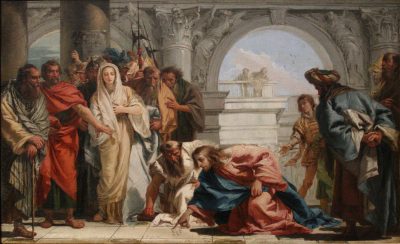 Readings:
Readings:
Isaiah 43:16–21
Psalm 126:1–6
Philippians 3:8–14
John 8:1–11
The Liturgy this Lent has shown us the God of the Exodus. He is a mighty and gracious God, Who out of faithfulness to His covenant has done “great things” for His people, as today’s Psalm puts it.
But the “things of long ago,” Isaiah tells us in today’s First Reading, are nothing compared to the “something new” that He will do in the future.
Today’s First Reading and Psalm look back to the marvelous deeds of the Exodus. Both see in the Exodus a pattern and prophecy of the future, when God will restore the fortunes of His people fallen in sin. The readings today look forward to a still greater Exodus, when God will gather in the exiled tribes of Israel that had been scattered to the four winds, the ends of the earth.
The new Exodus that Israel waited and hoped for has come in the death and resurrection of Jesus. Like the adulterous woman in today’s Gospel, all have been spared by the Lord’s compassion. All have heard His words of forgiveness, His urging to repentance, to be sinners no more. Like Paul in today’s Epistle, Christ has taken possession of every one, claimed each as a child of our heavenly Father.
In the Church, God has formed a people for Himself to announce His praise, just as Isaiah said He would. And as Isaiah promised, He has given His “chosen people” living waters to drink in the desert wastelands of the world (see John 7:37–39).
But our God is ever a God of the future, not of the past. We are to live with hopeful hearts, “forgetting what lies behind but straining forward to what lies ahead,” as Paul tells us. His salvation, Paul says, is power in the present, “the power of His resurrection.”
We are to live awaiting a still greater and final Exodus, pursuing “the goal, the prize of God’s upward calling,” striving in faith to attain the last new thing God promises—“the resurrection of the dead.”